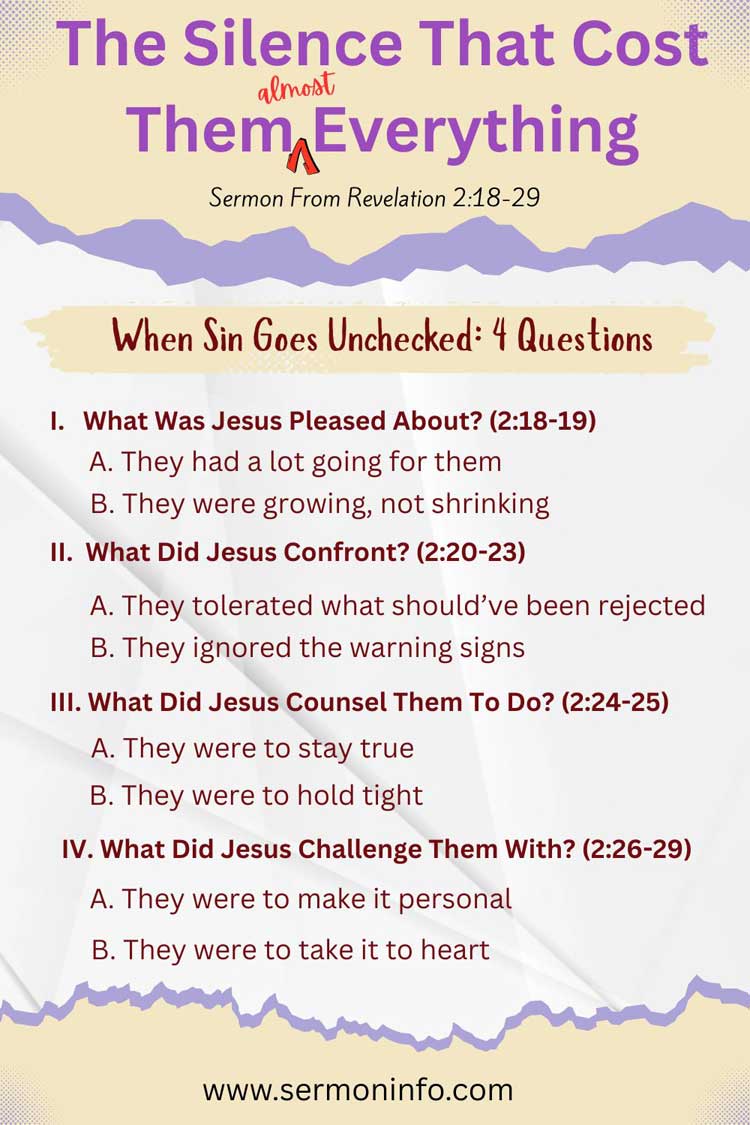Sermon from Revelation 2:18-29 (Thyatira): Jesus warns when sin goes unchecked, hidden corruption becomes contagious, and the whole church suffers.

Sermon From Revelation 2:18-29 (Thyatira)
Thyatira wasn’t a big city, but it had a big problem—compromise. Known for trade guilds, it was tough to follow Jesus there.
In that setting, Jesus wrote to a growing church that tolerated sin. Like a slow leak, what they ignored began to infect everything.
Unchecked sin spreads quietly, but its damage runs deep. Yet Jesus also promised this: those who stay faithful will share in His victory. Let’s hear His words together.
1. What Was Jesus Pleased With?
“And to the angel of the church in Thyatira write, ‘These things says the Son of God, who has eyes like a flame of fire, and His feet like fine brass: I know your works, love, service, faith, and your patience; and as for your works, the last are more than the first.” (Revelation 2:18-19)
A. They Had a Lot Going for Them
Jesus starts by saying, “I know your works” (v.19). That alone ought to stop us in our tracks. He sees. He knows. And what He saw in Thyatira was love, service, faith, and endurance. This was a church that seemingly cared deeply, served faithfully, trusted consistently, and kept going when things got tough. That’s no small thing.
It seems they weren’t coasting or just filling seats. They were living out their faith in visible ways. People were being loved. Needs were being met. They were pressing forward in hard times. This wasn’t a dead church—it was alive. Jesus always sees the good, even when He has to address the bad. He gives credit where it’s due because He delights in every sign of sincere devotion.
B. They Were Growing, Not Shrinking
Jesus adds something important: “Your latter works exceed the first.” That means they weren’t just holding the line—they were gaining ground. They were more committed now than when they began. Their love and service were increasing. This is the kind of progress every church should desire—to grow stronger and deeper in faith, not weaker or stale.
But here’s the warning: growth doesn’t cancel compromise. A church can grow in activity while declining in purity. Just because there’s motion doesn’t mean there’s health. Jesus applauds their momentum, but He still calls them to account. We must never let ministry progress excuse spiritual neglect. Faithfulness in the little things still matters to God (Luke 16:10).
2. What Did Jesus Confront?
“Nevertheless I have a few things against you, because you allow that woman Jezebel, who calls herself a prophetess, to teach and seduce My servants to commit sexual immorality and eat things sacrificed to idols. And I gave her time to repent of her sexual immorality, and she did not repent. Indeed I will cast her into a sickbed, and those who commit adultery with her into great tribulation, unless they repent of their deeds. I will kill her children with death, and all the churches shall know that I am He who searches the minds and hearts. And I will give to each one of you according to your works.” (Revelation 2:20–23)
A. They Tolerated What Should’ve Been Rejected
Jesus says, “I have this against you, that you tolerate that woman Jezebel . . .” (v.20). This wasn’t a minor disagreement—it was spiritual compromise. They allowed false teaching, likely wrapped in flattering words and spiritual language, to lead people into sin. They didn’t confront it, and they let it stay. And what we tolerate will eventually take root.
This so-called prophetess encouraged sexual immorality and idolatry. She taught people they could have Jesus and still live like the world. Sound familiar? That same spirit is alive today. The issue wasn’t just her teaching—it was the church’s silence. When we stop calling sin what it is, we start losing our voice and our power.
B. They Ignored the Warning Signs
Jesus had given her time to repent, but she refused (v.21). That tells us something about His heart—He’s patient, but He’s not passive. Mercy always precedes judgment, but when repentance is rejected, consequences follow. And in this case, they were severe.
Not just for her, but also for those who followed her down the wrong path. Jesus makes it clear: He searches hearts and minds. He sees motives, and He knows what we excuse and what we hide. And He won’t let sin go unchecked forever—not in our lives, not in our churches (Hebrews 4:13).
“This material provides some ideas and thoughts for a message from Revelation 2:18-29 on the topic: When Sin Goes Unchecked”
3. What Did Jesus Counsel Them To Do?
“Now to you I say, and to the rest in Thyatira, as many as do not have this doctrine, who have not known the depths of Satan, as they say, I will put on you no other burden. But hold fast what you have till I come.” (Revelation 2:24–25)
A. They Were to Stay True
Jesus speaks directly to “the rest” in Thyatira—those who didn’t follow her false teaching. He knew not everyone had gone astray. That’s encouraging. Even in a compromised church, faithfulness can still be found. And Jesus honors those who hold the line when others give in.
He says, “I do not lay on you any other burden.” In other words, don’t over complicate this. You don’t need new strategies—you just need to stay true. Sometimes the greatest act of faith is simply holding fast to what you know is right when the world seems to go the other way.
B. They Were to Hold Tight
“Hold fast what you have until I come” (v.25). That’s the call. Stay anchored. Keep your grip. Don’t trade the truth for trends or popularity. The pressure to let go of biblical conviction will always be there, but Jesus says, “Don’t let go.”
This is not about being loud or combative. It’s about quiet, stubborn faithfulness. Keep believing. Keep standing and keep trusting. Don’t let fear or fatigue steal what God has already planted in your heart. His Word is still true. His return is still certain. And your faithfulness still matters (Galatians 6:9).
4. What Did Jesus Challenge Them With?
“And he who overcomes, and keeps My works until the end, to him I will give power over the nations—‘He shall rule them with a rod of iron; They shall be dashed to pieces like the potter’s vessels’—as I also have received from My Father; and I will give him the morning star. He who has an ear, let him hear what the Spirit says to the churches.'” (Revelation 2:26–29)
A. They Were to Make It Personal
“To the one who conquers . . .” That’s not addressed to a committee or leadership team—it’s personal. Jesus narrows it down to you and me. He’s not just talking to the church as a whole. He’s calling individuals to overcome, to stand, and to finish strong.
“He who has an ear, let him hear . . .” (v.29). That’s a familiar phrase, but don’t miss it. It means pay attention. Tune in. Don’t assume someone else needs to hear this more than you do. When Jesus speaks, it’s not background noise. It’s life-giving truth for the one who’s willing to listen.
B. They Were to Take it to Heart
Jesus promises something beautiful: authority, victory, and the morning star (v.26–28). Those aren’t small rewards. They speak of shared reign with Christ and deep fellowship with Him. Faithfulness may cost something now, but it brings eternal reward.
The “morning star” is Jesus Himself (Revelation 22:16). He doesn’t just give us something—He gives us Himself. When sin goes unchecked, we lose clarity and intimacy. But when we conquer, we gain joy, closeness, and purpose that the world can’t offer. That’s worth everything.
Conclusion
Source Material
7 Churches of Revelation Explained Written Article Summarizing the 7 Churches of Revelation
Believer’s Bible Commentary by William MacDonald
The MacArthur Bible Commentary by John MacArthur
You Can Understand the Book of Revelation by Skip Heitzig
40 Days Through Revelation by Ron Rhodes
Revelation by Charles C. Ryrie
